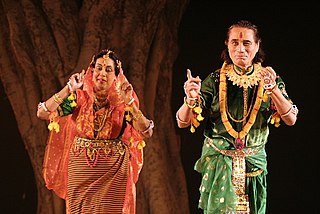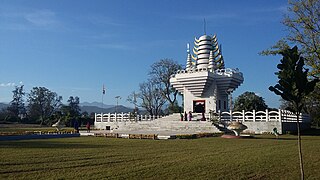
Sanamahism, also known as Meiteism, or Lainingthouism is an ethnic religion of the Meitei people of Manipur, in Northeast India. It is a polytheistic religion and is named after Lainingthou Sanamahi, one of the most important deities of the Meitei faith. Sanamahi is the eldest son of the supreme god Sidaba Mapu and the supreme goddess Leimarel Sidabi. Traditionally every Meitei household, irrespective of the religion, worships Sanamahi and Leimarel Sidabi. Sanamahism does not have a religious head but has a body, the Maru Loishang, that oversees the main religious activities and governs all affairs of the religion, including the conduct of priest and priestess. The Maru Loishang also acts a court for religious disputes. There are three main departments under the Manu Loishang, namely, the Amaiba Loishang, the Pena Asheiba Loishang, and the Amaibi Loishang. These departments have existed since the reign of King Meidingu Hongnemyoi Khunjao Naothingkhong of Manipur in 662 AD. Sanamahi is the eldest son of the supreme god Sidaba Mapu and the supreme goddess Leimarel Sidabi.

Rajkumar Singhajit Singh, is a leading exponent, choreographer and a guru of Indian classical dance form of Manipuri, including the Pung cholom and Raslila. He was awarded with the Sangeet Natak Akademi Award in 1984 and the Padma Shri in 1986 for his contribution to the Manipuri dance. In the year 2011, Sangeet Natak Akademi, India's The National Academy for Music, Dance and Drama, awarded him with its highest award, the Sangeet Natak Akademi Fellowship for his contribution to Indian Dance. In 2014 he was also conferred with the Tagore Award.
Darshana Jhaveri, the youngest of the four Jhaveri sisters, is a leading Indian exponent of Manipuri dance, an Indian classical dance form. She is a disciple of Guru Bipin Singh, and started performing on stage in 1958 along with her sisters. She is one of the founders of the Manipuri Nartanalaya in 1972, which popularized Manipuri dance in India, and is currently headed by her, with centres at Mumbai, Kolkata and Imphal.

Elam Endira Devi, is an Indian classical dancer and teacher, known for her expertise and scholarship in the classical dance form of Manipuri, especially in the genres of Lai Haraoba and Raas. The Government of India honored her, in 2014, with the Padma Shri, the fourth highest civilian award, for her services to the field of art and culture.

Pena is a mono string instrument falling in the lute category, slightly similar to some of the traditional Indian stringed musical instruments such as the ravanahatha, ubo or the kenda. It is the traditional musical instrument of Manipur, used mainly in the Lai Haraoba festival of Sanamahism. Pena playing is becoming a dying art as only 145 active Pena players are reported in Manipur. The Center for Research on Traditional and Indigenous Art (Laihui), an organization headed by renowned pena player, Khangembam Mangi Singh has mandated vision to revive pena music.

Khumanthem Ningol Nameirakpam Ongbi Ibemni Devi was an Indian singer of traditional music, known for her expertise in the Khongjom Praba genre of Manipuri music. The Government of India honoured Ibemni Devi in 2012, with the fourth highest civilian award of Padma Shri.
Haobam Ongbi Ngangbi Devi was an Indian classical dancer and musician, known for her expertise in the Manipuri Dance forms of Lai Haraoba and Raas. In 2010, the Government of India awarded Haobam Ongbi Ngangbi Devi the Padma Shri, the fourth highest Indian civilian award.
Rajkumar Achouba Singh is an Indian classical dancer and teacher, known for his scholarship on the Manipuri dance forms of Raas and Lai Haraoba. Singh, who is credited several books and articles on Manipuri culture, is a former Principal of the Jawaharlal Nehru Manipur Dance Academy, Imphal. A holder of post graduate degrees in Raas and Lai Haraoba, he has also been a visiting teacher at the Government Dance College, Imphal. He was honored by the Government of India, in 2010, with the fourth highest Indian civilian award of Padma Shri. He is also a recipient of the Manipur State Award.
Elangbam Nilakanta Singh (1927-2000) was an Indian poet and critic, considered by many as one of the pioneers of modern Meitei literature. A recipient of the Sahitya Akademi Award in 1987, Nilakanta Singh was honored by the Government of India, in 2000, with the fourth highest Indian civilian award of Padma Shri.
Kshetrimayum Ongbi Thouranisabi Devi is an Indian classical dancer and author, specialising in the Indian classical dance form of Manipuri. She was honoured by the Government of India in 2003 with Padma Shri, the fourth highest Indian civilian award.
Ningthoukhongjam Khelchandra Singh was an Indian writer, lexicographer and historian, known as the author of Manipuri to Manipuri and English, the first modern general dictionary in Meitei language, which was published in 1964. He was a fellow of the Sahitya Akademi and Sangeet Natak Akademi. The Government of India awarded him the fourth highest civilian honour of Padma Shri in 1987.
Rajkumar Jhalajit Singh was an Indian writer, historian, Gandhian and academic. He was known for his book, "A Short History of Manipur", which was banned from publishing or selling by his own family members, because the book misleads the readers that the Manipuris are the descendants of Arjuna of the Mahabharata.
Sougaijam Thanil Singh is an Indian classical dancer, known for his proficiency in the classical dance forms of Manipuri and Nata Sankirtana. Born to S. Ksher Singh, a Manipuri dancer, in the Northeast Indian state of Manipur, he received his early training from his father as well as Guru Tombi Sharma, Guru Bhaigchandra Singh and Guru Koireng Singh. Later, he studied Manipuri dance and Nata Sankirtana, under Maisnam Amubi Singh, renowned dancer and Padma Shri awardee, at the Jawaharlal Nehru Manipur Dance Academy, Imphal, securing a diploma and a post graduate diploma, respectively, in the disciplines.
Yumlembam Gambhini Devi is an Indian singer of Nata Sankirtana and dancer of Manipuri Raas. She is a member of faculty at Jawaharlal Nehru Manipur Dance Academy (JNMDA) and a recipient of the 1988 Sangeet Natak Akademi Award. The Government of India awarded her the fourth highest civilian honour of the Padma Shri, in 2005, for her contributions to Manipuri dance and music.
Thingbaijam Babu Singh was an Indian classical dancer, academic and choreographer of the Indian classical dance form of Manipuri. He was the Pradhan Guru of Pung and Raas traditions of Manipuri dance at the Jawaharlal Nehru Manipur Dance Academy of the Sangeet Natak Akademi. Born on 8 February 1936 at Lairensajik, a small village in the state of Manipur, he was known to have been one of the notable choreographers and teachers of Manipuri dance and had a long line of renowned performers such as Elam Endira Devi, Ibemubi Devi, and Priti Patel, as his students. Singh was the author of a book, Meitei Punglon Raga Ahouba, and was a recipient of the Sangeet Natak Akademi Award for the year 1990. The Government of India awarded him the fourth highest civilian honour of the Padma Shri, in 2007, for his contributions to Manipuri dance.

Nongshaba is a lion god in Sanamahism and Meitei mythology. He is also regarded as a king of the gods. He is credited with producing light in the primordial universe and is regarded as the maker of the sun. He is worshipped by the people of both the Ningthouja clans as well as the Moirang clans. Nongshaba was worshipped by the people of Moirang clan as a lineage deity and regarded as the father of the god Thangching. He is the greatest of the Umang Lais but he made his only son Thangching the chief deity of Moirang.
The Khamba Thoibi Sheireng, also spelled as the Khamba Thoibi Seireng, is a Classical Meitei language epic poem based on the ancient love story of Khuman prince Khamba and Moirang princess Thoibi of Ancient Moirang kingdom of Ancient Kangleipak. It is the magnum opus of Hijam Anganghal, the "Bard of Samurou". It is regarded as the national epic of the Manipuris. It is regarded as the greatest of all the epic poems in Meitei literature, with 39,000 verses, thereby being the third longest Indian epic poem, next to the Mahabharata and the Ramayana.
Lourembam Bino Devi is a practitioner and a popularizer of the appliqué art of Manipur called Leeba in the Meitei language. The Leeba art is used in creating Monmai which is a decorative circular appliqué art piece used in covering both ends of the traditional Manipuri bolster pillow. In the olden days, Leeba was practiced at "Phiribi Loishang", which is a house for maintaining clothes worn by the deities and royals. The apparels used by the royals, including shoes, were mostly designed using the Leeba technique. Bino Devi has devoted her life to practice this art form and to revive it by trying to transmit her skills to younger generation of interested women. She has been providing this training in collaboration with the Heritage Foundation of Mankind, a Non-Governmental Organization located in Imphal. She has also conducted several workshops at Imphal and at various other places in India.

The Laihui Ensemble is a centre for research on traditional and indigenous performing arts, based on Imphal, Manipur. It was established in 1985. The association is performing different art shows at different venues across different nations in the world. Mangka Mayanglambam is one of the most active artists of the ensemble, and is trying her best to revive the dying art forms of Manipur including the Moirang Sai.

The culture of Meitei civilization evolved over thousands of years, beginning in Ancient Kangleipak, continuing most notably into Medieval Kangleipak, while influencing the neighboring states and kingdoms, till present times.







